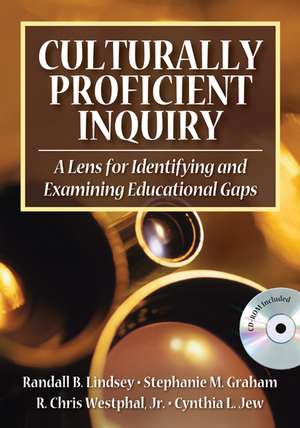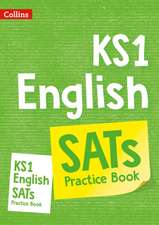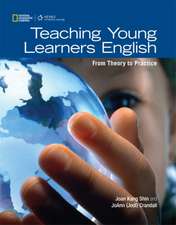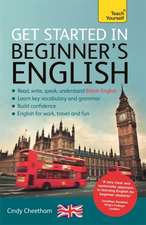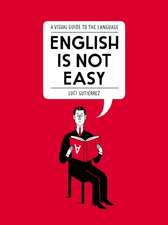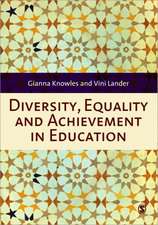Culturally Proficient Inquiry: A Lens for Identifying and Examining Educational Gaps
Editat de Randall B. Lindsey, Stephanie M. Graham, R. (Raymond) Chris (Christian) Westphal, Cynthia L. Jewen Limba Engleză Paperback – 21 apr 2008
Preț: 300.49 lei
Nou
Puncte Express: 451
Preț estimativ în valută:
57.50€ • 60.03$ • 47.59£
57.50€ • 60.03$ • 47.59£
Carte tipărită la comandă
Livrare economică 05-19 aprilie
Preluare comenzi: 021 569.72.76
Specificații
ISBN-13: 9781412926027
ISBN-10: 1412926025
Pagini: 256
Dimensiuni: 178 x 254 x 16 mm
Greutate: 0.55 kg
Ediția:1
Editura: SAGE Publications
Colecția Corwin
Locul publicării:Thousand Oaks, United States
ISBN-10: 1412926025
Pagini: 256
Dimensiuni: 178 x 254 x 16 mm
Greutate: 0.55 kg
Ediția:1
Editura: SAGE Publications
Colecția Corwin
Locul publicării:Thousand Oaks, United States
Recenzii
"Provides the information and tools needed to create powerful learning communities in which the academic and co-curricular needs and the well-being of all students are addressed through purposeful inquiry and culturally proficient practices. This text is a must-read for educational leader preparation programs and for all educational leaders who want to make a difference."
"The culturally proficient inquiry model provides us with a process for examining the strategies and practices that support or prevent equitable access to learning. Understanding what it means to be culturally proficient and becoming culturally proficient places of learning is fundamental to student success and achievement."
"Finally, a publication that makes cultural proficiency understandable for school leaders and teaching staffs and provides the practical means for leaders to address cultural proficiency in schools, districts, and communities. A useful how-to guide for this critically important work."
"The authors take a comprehensive approach to educational reform, one that fosters schools' cultural proficiency in four broad areas: assessment and accountability, curriculum and instruction, home-school relations, and teacher professional development. They manage to both convey the magnitude and complexity of the problem of schools underserving their constituencies and illuminate a path to positive change."
"An outstanding field manual. It provides the context, framework, and tools for district and school staffs to have 'fierce conversations' about institutional and personal responsibility for closing the achievement gap. A must-read for those serious about educating all students."
"The authors have created the ultimate practical resource for determining how to make cultural proficiency work in our organizations. A must-have for those of us who are seriously and genuinely committed to going on a journey toward cultural proficiency!"
"The authors effectively empower educators with the knowledge, will, and skill to close educational gaps. This book takes educators on a thorough journey of learning and reflection, examining data, presenting information, discussing best practices, and posing questions. It provides the tools, rubrics, and matrices to help educators review, revise, and measure their practices and progress toward cultural proficiency."
"A change in the rhetoric from underperforming stakeholders (be they students, parents, teachers, or staff) to underserved stakeholders is critically needed. Educators can change the rhetoric and shift the sense of responsibility onto the adults in the system who can do something about closing gaps and thereby educate others on how the deficit model of blaming those who are underperforming does nothing to transform the system to better serve all stakeholders."
"What is best about this remarkable book is its constant reminder that the courage to do what is just and right for the 'underserved' comes to those who face the 'brutal facts,' listen to the difficult questions, and seek support and guidance from the educators in the field. This book is an inspiring companion needed now more than ever."
"The culturally proficient inquiry model provides us with a process for examining the strategies and practices that support or prevent equitable access to learning. Understanding what it means to be culturally proficient and becoming culturally proficient places of learning is fundamental to student success and achievement."
"Finally, a publication that makes cultural proficiency understandable for school leaders and teaching staffs and provides the practical means for leaders to address cultural proficiency in schools, districts, and communities. A useful how-to guide for this critically important work."
"The authors take a comprehensive approach to educational reform, one that fosters schools' cultural proficiency in four broad areas: assessment and accountability, curriculum and instruction, home-school relations, and teacher professional development. They manage to both convey the magnitude and complexity of the problem of schools underserving their constituencies and illuminate a path to positive change."
"An outstanding field manual. It provides the context, framework, and tools for district and school staffs to have 'fierce conversations' about institutional and personal responsibility for closing the achievement gap. A must-read for those serious about educating all students."
"The authors have created the ultimate practical resource for determining how to make cultural proficiency work in our organizations. A must-have for those of us who are seriously and genuinely committed to going on a journey toward cultural proficiency!"
"The authors effectively empower educators with the knowledge, will, and skill to close educational gaps. This book takes educators on a thorough journey of learning and reflection, examining data, presenting information, discussing best practices, and posing questions. It provides the tools, rubrics, and matrices to help educators review, revise, and measure their practices and progress toward cultural proficiency."
"A change in the rhetoric from underperforming stakeholders (be they students, parents, teachers, or staff) to underserved stakeholders is critically needed. Educators can change the rhetoric and shift the sense of responsibility onto the adults in the system who can do something about closing gaps and thereby educate others on how the deficit model of blaming those who are underperforming does nothing to transform the system to better serve all stakeholders."
"What is best about this remarkable book is its constant reminder that the courage to do what is just and right for the 'underserved' comes to those who face the 'brutal facts,' listen to the difficult questions, and seek support and guidance from the educators in the field. This book is an inspiring companion needed now more than ever."
Cuprins
Foreword
Preface
Acknowledgments
About the Authors
Part I. Creating Culturally Proficient Schools
1. The Unfolding of the Democracy as a Moral Imperative
2. The Tools of Cultural Proficiency
Part II. Knowing the Demographics of Your School
3. NAEP Data Show the Way, With Limitations
4. The Peer Group Model: Achievement and Access Data
5. Planning the Cultural Proficiency Inquiry
6. Rubrics as Keys to the Cultural Proficiency Inquiry
Part III. The ABC Case Study School and Your School
7. Data Set #1: Finding Meaning in Achievement Data
8. Data Set #2: Finding Meaning in Student Access Data
9. Data Set #2 (Extended): Finding Meaning in Access Data Unique to Secondary Schools
10. Data Set #3: Profiles of Educator Conversations About Your Students
11. Advocacy for Social Justice
Appendix
References
Index
Preface
Acknowledgments
About the Authors
Part I. Creating Culturally Proficient Schools
1. The Unfolding of the Democracy as a Moral Imperative
2. The Tools of Cultural Proficiency
Part II. Knowing the Demographics of Your School
3. NAEP Data Show the Way, With Limitations
4. The Peer Group Model: Achievement and Access Data
5. Planning the Cultural Proficiency Inquiry
6. Rubrics as Keys to the Cultural Proficiency Inquiry
Part III. The ABC Case Study School and Your School
7. Data Set #1: Finding Meaning in Achievement Data
8. Data Set #2: Finding Meaning in Student Access Data
9. Data Set #2 (Extended): Finding Meaning in Access Data Unique to Secondary Schools
10. Data Set #3: Profiles of Educator Conversations About Your Students
11. Advocacy for Social Justice
Appendix
References
Index
Descriere
Use inquiry to promote equity and transform your school’s educational environment!
Using cultural proficiency as a lens, the authors guide practitioners through the process of gathering and analyzing data to meet the needs of historically underserved students. This book outlines a critical evaluation process and provides rubrics to examine why some students are not being educated to their full potential. With a CD-ROM of tables and spreadsheets for data entry, the book show educators how to:
- Encourage discussions about educational equity
- Create a realistic picture of a school's cultural and economic diversity
- Initiate authentic systemic change
- Effectively respond to NCLB mandates
